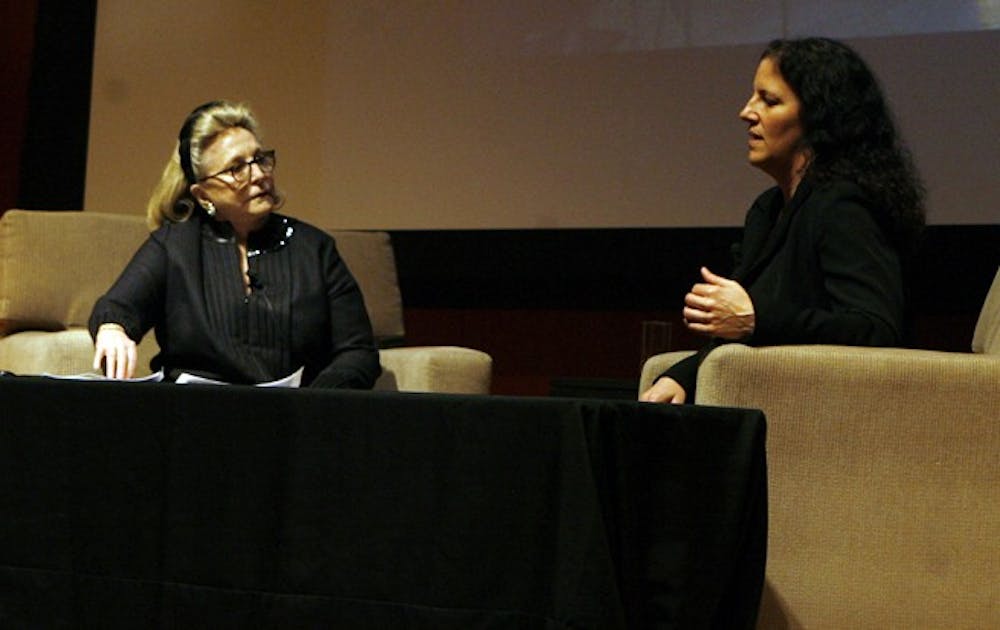Laura Poitras, a recently named 2012 MacArthur Fellow, spoke about post-9/11 politics in America, as well as her journey as a filmmaker at the Nasher Museum of Art Wednesday night.
Poitras came to Duke as the second artist in the biennial Barbaralee Diamonstein-Spielvogel Visiting Filmmaker Series. The films in Poitras’ most recent project—a trilogy about the shift in global politics post 9/11—have received many accolades, including nominations for both Academy and Emmy Awards. The first two films, “My Country, My Country” and “The Oath,” were released in 2006 and 2010, respectively. The third installment is currently in progress. Poitras emphasized that even though some of her films are set abroad, they do not focus solely on the problems of the Middle East because they are American problems, as well.
“If we had all gone into a coma on September 11 and we woke up today—well, we have this prison called Guantanamo, we have a kill list, we have legalized torture, we have the [National Security Agency] spying on us, “ Poitras said. “We would think, ‘What happened? What has happened to the country?’"
She criticized mainstream media for “cheerleading” and falling in line in the face of fear rather than asking difficult questions.
Poitras makes films to help others understand the war and the on-the-ground experiences—such as gentrification, U.S. Army occupation or government surveillance, she said. Toward the end of the night, she said she wished she could maintain all of the relationships with her film subjects and coworkers.
“She’s just so good at presenting an alternative reality of people living abroad,” said Durham resident and audience member Larissa Oryshkevis, adding that she was deeply moved by “The Oath.” “Their lives are different from our own, but you can identify with them as human beings.”
Ultimately, Poitras hopes that her films will help spark greater public dialogue and debate, though she admitted they have not sparked as much discussion as she would like.
“I still can’t believe we haven’t had hearings over Guantanamo,” Poitras said. “If we perceive ourselves to be a country based on a rule of law, things should be different.”
Poitras said the MacArthur Fellowship, which provides a $500,000 stipend over five years, has given her freedom to work and recognition that allows her to continue making films in the face of government antagonism.
She said she was placed on a United States government watch list and continues to be harassed whenever she re-enters the United States, following the release of “My Country, My Country,” which explores the United States’ occupation in Iraq. The Department of Homeland Security has detained and interrogated her, and they have also confiscated her computer and camera.
“Is there anyone here from Homeland Security?” Poitras asked the audience, waving her arm. “Maybe they could answer that. They don’t tell you why they put you on the list.”
She added that she initially believed the government had made a mistake and would change its mind about targeting her journalistic work. But after six years without a change, she realized that she was naïve. She now lives part-time in Berlin, where she said she feels more free.
“Just because we call ourselves a democracy, doesn’t meant that it will stay that way,” said William Binney, a former National Security Agency employee, in a clip from the third installment of Poitras’ series.
Peter Lisignoli, a second-year graduate student in experimental and documentary arts, said that as an aspiring filmmaker, he appreciated the conversation with Poitras and the critical issues it raised.
“We were given the opportunity to learn more about the entire filmmaking process from the seed of an idea to the promotion and reception of a film as well as the entire arc of [the filmmaker’s] career,” said Kirston Johnson, an archivist with the archive of documentary arts, who was in charge of the event.
Johnson, one of the individuals responsible for selecting the filmmakers for the series, noted that Poitras is one of the most articulate filmmakers she has ever worked with.
“She not only conveys information to her audience, but emotional information, and she does that with the films and in her interactions with people one-on-one,” Johnson said.
The Barbaralee Diamonstein-Spielvogel Visiting Filmmaker Series was founded in 2010 to feature artists whose work addresses significant contemporary topics of social, political economic and cultural urgency. The artists are invited to Duke for a two-day residency.
Get The Chronicle straight to your inbox
Signup for our weekly newsletter. Cancel at any time.

